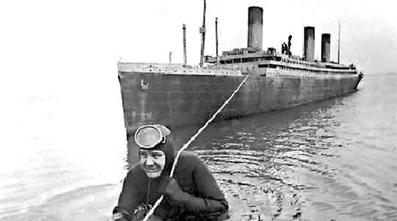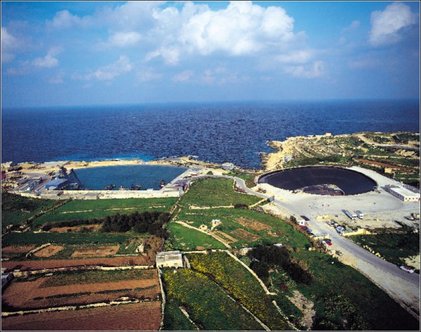A brief history about the world-renowned Water SFX Facility
In 1963 the SFX wizard Benjamin ‘Jim’ Hole was filming on the Spanish coast when he encountered stormy seas which turned his filming experience into a nightmare.
It was during a visit in Malta one year later when Jim decided to build a shallow “horizon” tank for his next water-based film called “The Bedford Incident”. The tank was built with the aid of government subsidies offered by the British government which then ruled the island. The tank was later kept in operation for other potential films and aka Malta Film Facilities or MFF was born.
MFF hosted several large films and mini-series like “Orca the Killer Whale” and “Christopher Columbus”. In 1980 a second tank, this time concave-shaped, was built by British producer Lord Grade for the film “Raise the Titanic”.
It was during a visit in Malta one year later when Jim decided to build a shallow “horizon” tank for his next water-based film called “The Bedford Incident”. The tank was built with the aid of government subsidies offered by the British government which then ruled the island. The tank was later kept in operation for other potential films and aka Malta Film Facilities or MFF was born.
MFF hosted several large films and mini-series like “Orca the Killer Whale” and “Christopher Columbus”. In 1980 a second tank, this time concave-shaped, was built by British producer Lord Grade for the film “Raise the Titanic”.
MFF became renowned not only for its unique horizon tanks but also for its skilled construction workforce. Eventually MFF's name was changed to “Mediterranean Film Studios” or MFS.
During it's first 30 years the company was managed by various government political appointees. Notably the most long-standing manager was the late Paul Avellino who was quick to earn himself an international reputation.
In the mid-90’s, the Maltese government, adhering to its policy for privatisation of its enterprises, decided to hand-over MFS to a Canadian businessman Charles J. Falzon from Catalyst Entertainment based in Toronto. Under Falzon's chairmanship the studio saw some large films such as “White Squall”, “Cut-Throat Island” and “U-571”. The privatisation of MFS proved to be an important step for the company.
However, the company’s overheads were increasing fast and becoming unsustainable against what was essentially still a very volatile industry. The company had inherited over 40 employees from its state ownership and the tanks acted as the bank's security for the funding and creation of a movie theme park which unfortunately was unable to turn a consistent profit. Some argue that this new enterprise eventually became the straw that broke the camel's back.
In 1998 the company radically downsized its management team in an effort to run operations more cost efficiently. Local production manager Malcolm Scerri-Ferrante (the founder of PCP) was appointed by Catalyst Entertainment to head its production and marketing departments. In the two years that followed he introduced radical new policies and business practices. He fostered the inclusion of Maltese crew from the local TV industry and tapped into other resources, such as graduates from the local university media studies, in order to build a local film crew base that could work hand in hand with foreign crew. This was the first time in three decades that Maltese enjoyed key positions on film shoots. He also opened the studio's doors to the national press which helped with increasing a public awareness about the untapped potential of the film industry and the urgent need for financial incentives. Gradually MFS managed to increase political support for the growth in the film industry.
The year 1999 was to become the busiest year for MFS in what was then it's 35 year old history. It became so busy that on one day two productions were filming in the same tank, a CBS TV Series and a Belgian TV commercial.
In the same year the industry saw the setup of the Malta Film Commission, following proposals made by PCP founder Malcolm Scerri-Ferrante to two prime ministers in 1996 and 1997. Helping to speed up the process was the further lobbying of producer Branko Lustig prior to shooting "Gladiator" in Malta.
Despite these busy times, the financial debts of MFS proved to be too big to disappear overnight. The failed theme park, which had begun running at an operating loss, was finally shut down in 2000. At this same time German entrepreneur Jost Merten, who was then a minority shareholder of the theme park, become MFS's new owner as other shareholders relinquished their shares. Merten managed to keep the facility afloat for 14 more years, amidst the occasional debate as to whether he should have invested in the studio's infrastructure. Truth be told, Merten managed to put MFS on a financially viable path. Notwithstanding this, the local 'debates' continued and these were not helped by Merten's exploration of the idea to turn one of the least used tanks into a fish farm so to minimise financial losses, an idea which dropped soon after his studies were concluded.
To add to the controversies, for many years Merten had looming over his head an unresolved case with government about ground rent. Rent had not been paid since the privatisation of the facility in the mid-90's, before Merten took over. Various ministers and government administrations are said to have tolerated this accumulating debt in consideration to the fact that Merten was key to the survival of the facility and saving it from bankruptcy, which would have caused serious damage to the island's film servicing industry. In court Merten claimed to have offered a settlement plan years before he was slammed with a court case. But in 2014, after years of litigation, a judge still ordered Merten to vacate the land. By the time the case was heard in court the government had changed.
Upon taking over the entire premises, the new government immediately set up a board comprised of successful businessmen with the remit to prepare a report about the commercial prospects of the tanks and land. The goal: to turn it into a first-class facility with at least one sound stage.
The facility - now renamed Malta Film Studios - is currently being managed by the government as an interim measure. A public tender was issued in the fall of 2015 in accordance with EU regulations. As of January 2021 the studio is still being run by the government after the public tender process had failed to attract investors. The government has committed some 35m Euros into the upgrading of the facility, which should include its first sound stages.
However, the company’s overheads were increasing fast and becoming unsustainable against what was essentially still a very volatile industry. The company had inherited over 40 employees from its state ownership and the tanks acted as the bank's security for the funding and creation of a movie theme park which unfortunately was unable to turn a consistent profit. Some argue that this new enterprise eventually became the straw that broke the camel's back.
In 1998 the company radically downsized its management team in an effort to run operations more cost efficiently. Local production manager Malcolm Scerri-Ferrante (the founder of PCP) was appointed by Catalyst Entertainment to head its production and marketing departments. In the two years that followed he introduced radical new policies and business practices. He fostered the inclusion of Maltese crew from the local TV industry and tapped into other resources, such as graduates from the local university media studies, in order to build a local film crew base that could work hand in hand with foreign crew. This was the first time in three decades that Maltese enjoyed key positions on film shoots. He also opened the studio's doors to the national press which helped with increasing a public awareness about the untapped potential of the film industry and the urgent need for financial incentives. Gradually MFS managed to increase political support for the growth in the film industry.
The year 1999 was to become the busiest year for MFS in what was then it's 35 year old history. It became so busy that on one day two productions were filming in the same tank, a CBS TV Series and a Belgian TV commercial.
In the same year the industry saw the setup of the Malta Film Commission, following proposals made by PCP founder Malcolm Scerri-Ferrante to two prime ministers in 1996 and 1997. Helping to speed up the process was the further lobbying of producer Branko Lustig prior to shooting "Gladiator" in Malta.
Despite these busy times, the financial debts of MFS proved to be too big to disappear overnight. The failed theme park, which had begun running at an operating loss, was finally shut down in 2000. At this same time German entrepreneur Jost Merten, who was then a minority shareholder of the theme park, become MFS's new owner as other shareholders relinquished their shares. Merten managed to keep the facility afloat for 14 more years, amidst the occasional debate as to whether he should have invested in the studio's infrastructure. Truth be told, Merten managed to put MFS on a financially viable path. Notwithstanding this, the local 'debates' continued and these were not helped by Merten's exploration of the idea to turn one of the least used tanks into a fish farm so to minimise financial losses, an idea which dropped soon after his studies were concluded.
To add to the controversies, for many years Merten had looming over his head an unresolved case with government about ground rent. Rent had not been paid since the privatisation of the facility in the mid-90's, before Merten took over. Various ministers and government administrations are said to have tolerated this accumulating debt in consideration to the fact that Merten was key to the survival of the facility and saving it from bankruptcy, which would have caused serious damage to the island's film servicing industry. In court Merten claimed to have offered a settlement plan years before he was slammed with a court case. But in 2014, after years of litigation, a judge still ordered Merten to vacate the land. By the time the case was heard in court the government had changed.
Upon taking over the entire premises, the new government immediately set up a board comprised of successful businessmen with the remit to prepare a report about the commercial prospects of the tanks and land. The goal: to turn it into a first-class facility with at least one sound stage.
The facility - now renamed Malta Film Studios - is currently being managed by the government as an interim measure. A public tender was issued in the fall of 2015 in accordance with EU regulations. As of January 2021 the studio is still being run by the government after the public tender process had failed to attract investors. The government has committed some 35m Euros into the upgrading of the facility, which should include its first sound stages.



